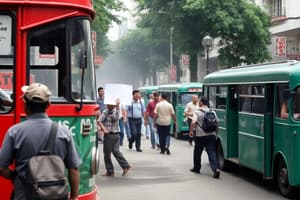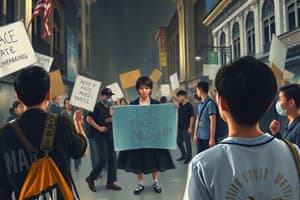Podcast
Questions and Answers
What was one of the primary challenges faced by the Labour Front government from its inception?
What was one of the primary challenges faced by the Labour Front government from its inception?
- Formation of a majority through a coalition (correct)
- Unified party ideals and goals
- Immediate majority win in elections
- Strong public support from various demographics
How many seats did the Labour Front win in the elections?
How many seats did the Labour Front win in the elections?
- 15
- 5
- 10 (correct)
- 3
What was a contributing factor to the lack of internal cohesion within the Labour Front coalition?
What was a contributing factor to the lack of internal cohesion within the Labour Front coalition?
- Uniform political ideologies
- Strong leadership directing all parties
- Common interests among coalition members
- Diverse aims and interests of coalition members (correct)
Which party worked closely with the Chinese majority and collaborated with leftist elements?
Which party worked closely with the Chinese majority and collaborated with leftist elements?
What perception did the PAP create regarding the Labour Front government?
What perception did the PAP create regarding the Labour Front government?
What major obstacle did Marshall face in building broad-based support?
What major obstacle did Marshall face in building broad-based support?
What was the outcome of the clash between British skepticism and the Labour Front's aims?
What was the outcome of the clash between British skepticism and the Labour Front's aims?
What issue was created by the Rendel Constitution regarding the Chief Minister's role?
What issue was created by the Rendel Constitution regarding the Chief Minister's role?
How did Governor Sir John Nicoll regard David Marshall's position as Chief Minister?
How did Governor Sir John Nicoll regard David Marshall's position as Chief Minister?
What position did Marshall wish to serve in?
What position did Marshall wish to serve in?
What was the British perspective regarding the pace of constitutional change?
What was the British perspective regarding the pace of constitutional change?
Why did Marshall create a separate Ministry of Commerce and Industry?
Why did Marshall create a separate Ministry of Commerce and Industry?
What did the consultation requirement between the Governor and Chief Minister lack clarity on?
What did the consultation requirement between the Governor and Chief Minister lack clarity on?
What was the primary cause of the Hock Lee Bus Riots?
What was the primary cause of the Hock Lee Bus Riots?
Who were the key participants in the Hock Lee Bus Riots?
Who were the key participants in the Hock Lee Bus Riots?
What was the primary concern of the leader regarding the use of force against the workers?
What was the primary concern of the leader regarding the use of force against the workers?
What was the stance of the Labour Front during the riots?
What was the stance of the Labour Front during the riots?
Which strategy did Marshall employ in response to the riots?
Which strategy did Marshall employ in response to the riots?
Who had successfully infiltrated the trade unions linked to the Hock Lee Bus Riots?
Who had successfully infiltrated the trade unions linked to the Hock Lee Bus Riots?
What was one of Marshall's anti-colonial aims during the riots?
What was one of Marshall's anti-colonial aims during the riots?
What was a significant challenge faced by Marshall during the Hock Lee Bus Riots?
What was a significant challenge faced by Marshall during the Hock Lee Bus Riots?
What was the main concern regarding the British proposal for a joint defense council?
What was the main concern regarding the British proposal for a joint defense council?
How did the Labour Front government respond to challenges such as student riots?
How did the Labour Front government respond to challenges such as student riots?
What was the outcome of Marshall's negotiations in London regarding self-government for Singapore?
What was the outcome of Marshall's negotiations in London regarding self-government for Singapore?
What commitment did Marshall make before going to London for negotiations?
What commitment did Marshall make before going to London for negotiations?
What did Martin mean when he compared the British offer to 'Christmas pudding with arsenic sauce'?
What did Martin mean when he compared the British offer to 'Christmas pudding with arsenic sauce'?
What role did the British want to retain under the proposed terms for Singapore's governance?
What role did the British want to retain under the proposed terms for Singapore's governance?
What was a significant factor for the Labour Front government to adopt a more aggressive approach?
What was a significant factor for the Labour Front government to adopt a more aggressive approach?
What was a consequence of the breakdown of the Merdeka Talks for Marshall?
What was a consequence of the breakdown of the Merdeka Talks for Marshall?
What was the primary outcome of the Citizenship Ordinance of 1957?
What was the primary outcome of the Citizenship Ordinance of 1957?
Which factor contributed to the high voter turnout of 92.9%?
Which factor contributed to the high voter turnout of 92.9%?
How many political parties were contesting in the 1959 election compared to 1955?
How many political parties were contesting in the 1959 election compared to 1955?
What was a significant advantage of the People's Action Party (PAP) during the election?
What was a significant advantage of the People's Action Party (PAP) during the election?
What event marked the achievement of full self-government for Singapore?
What event marked the achievement of full self-government for Singapore?
What percentage of the seats did the People's Action Party (PAP) win in the 1959 elections?
What percentage of the seats did the People's Action Party (PAP) win in the 1959 elections?
Which political party struggled to maintain its appeal among the voters?
Which political party struggled to maintain its appeal among the voters?
Which group was most affected by the Citizenship Ordinance of 1957?
Which group was most affected by the Citizenship Ordinance of 1957?
Flashcards are hidden until you start studying
Study Notes
Challenges Faced by David Marshall
- Marshall's inability to gain broad-based support hindered his governance efforts.
- Trade unions, influenced by pro-communists, resorted to strikes and protests, notably the Hock Lee Bus Riots, undermining Marshall’s authority.
- British skepticism about the pace of constitutional change delayed self-government discussions, clashing with Marshall's Labour Front's aspirations for rapid reforms.
- The Rendel Constitution lacked clarity on the Chief Minister's role, weakening local governance; it outlined consultation with the Governor but left power dynamics undefined.
- Governor Sir John Nicoll viewed Marshall's position as a figurehead, failing to provide a proper office or recognition for his authority.
Internal Conflicts within the Labour Front
- The Labour Front lacked a strong popular mandate, winning only 10 seats and relying on a coalition with the Alliance Party for majority support.
- Coalition members held diverse and sometimes conflicting ideologies, leading to difficulties in establishing party unity.
- Strong opposition from parties like the People’s Action Party (PAP) portrayed Labour Front as a British puppet, gaining traction among the Chinese-speaking population.
Hock Lee Bus Riots
- The riots arose from grievances of Chinese workers feeling mistreated, involving trade unions and student activists.
- Marshall's reluctance to use force reflected his intention to build rapport with workers and avoid appearing as a British collaborator.
- The riots tested the Labour Front's commitment to worker rights pledged during the election campaign.
First Merdeka Talks (1956)
- Marshall led a delegation to negotiate for self-government but faced British conditions that kept control over internal security and constitutional authority.
- The failure to secure independence led to Marshall's resignation as promised upon returning from talks.
Second Labour Front Government
- This government adopted a firmer stance against opposition, particularly during student riots, to regain British trust.
- The Citizenship Ordinance of 1957 expanded voter eligibility to numerous residents, significantly increasing electoral participation.
- Compulsory voting led to a high voter turnout of 92.9%, emphasizing the influence of Chinese-educated and lower-income voters in elections.
Rise in Political Parties
- The political landscape evolved with an increasing number of parties, from 6 in 1955 to 13 by 1959, leading to a more diverse electoral competition.
- The significant rise in candidates, from 69 to 194, heightened the competitive atmosphere for the 1959 elections.
- The People’s Action Party (PAP) emerged strong after the Labour Front lost credibility, particularly among the Chinese-educated community.
Significance of the 1959 Election
- This election resulted in Singapore attaining full self-government; Yusof Ishak became the first Head of State.
- The unveiling of Singapore’s state flag, crest, and National Anthem marked a new era of national identity.
- PAP’s successful mass mobilization in previous elections and its association with honesty and reform contrasted sharply with the Labour Front’s declining popularity, solidifying its political dominance.
Studying That Suits You
Use AI to generate personalized quizzes and flashcards to suit your learning preferences.


